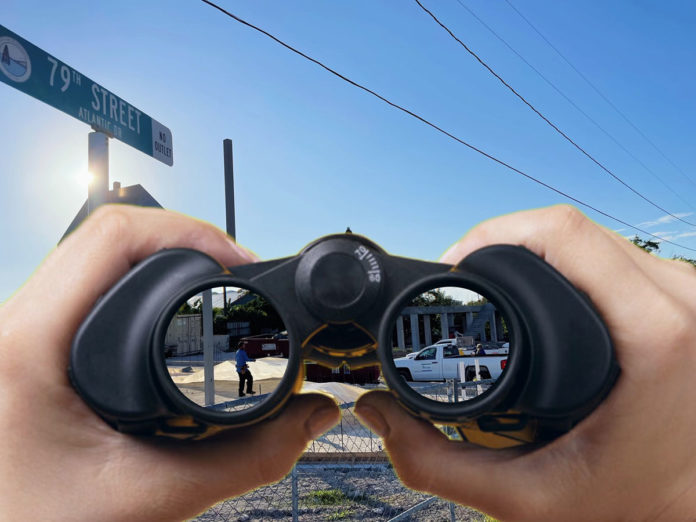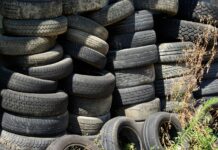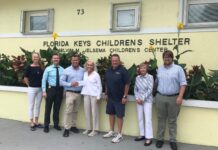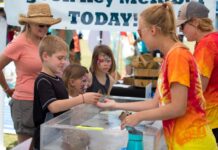
By Meghan Richardson
Thanks to our keenly observant locals, new construction creates quite the buzz around town. An often-uttered question is, “Is it housing?” This is followed with, “Will it be affordable?”
To answer these questions at the corner of 79th Street and Overseas Highway in Marathon, Habitat for Humanity of the Middle Keys (HFHMK) has great news. The Anchor Inn, which stood sentinel for 64 years on that corner, graciously gave up its post to make way for HFHMK’s largest build to date: eight affordable homes plus a combination affiliate office and Habitat ReStore. This build, named Bell Haven in honor of the late Jill Bell, is slated to be complete by late 2023.
“This project has been a crazy dream since 2018 when we asked ourselves, as an affiliate, what could we do if we ever got ownership of a large parcel of land?” said Chris Todd Young, HFHMK executive director. “The discussion quickly took shape that beyond the ever-present need for affordable homes, our community desperately needed a ReStore. We get calls daily from people wanting to donate or are in search of items. People constantly stop in our office asking if we are a ReStore.”
Fast forward four years and that “crazy dream” is transforming into concrete foundations, columns, stairs and floors. Thanks to cooperation among IMBY LLC (then-owner of the Anchor Inn property), Monroe County, the City of Marathon, and HFHMK, the land was acquired, designs were created, and permits were pulled. Keys Contracting Services is heading up the build of eight side-by side duplexes, with six three-bedroom, 2.5-bathroom units and two two-bedroom, 1.5-bathroom units.
“It’s so exciting and also scary,” said Young. “Exciting because we are answering not one but two needs for our community. Scary because of the price tag. Back in 2015, we could get a modular for around $175,000. These homes are costing nearly $400,000 each. That’s a lot of fundraising, and no, we haven’t raised enough yet to reach the finish line. So yeah, it’s scary, but our community needs this.”
The project’s estimated cost is just shy of $5 million, of which HFHMK has raised nearly $3 million so far. Instrumental in Habitat’s efforts are the State of Florida, Department of Economic Opportunity, Baptist Health South Florida, the Homeownership for All license plate grant, Publix Super Markets Charities, the Community Foundation of the Florida Keys, Bank of America, Wells Fargo and Truist Foundation. Additionally, donations have been made in honor of the late Jill Bell, Joseph Rabito, Robert Guerin and Nancy Coletti. Beyond donations and grants, HFHMK applies the mortgage principal payments made by current Habitat homeowners toward new build costs.
“If all of our locals donated just $25, it will bring us over $200,000 closer,” said Young. “I think people worry if they can’t give much, but small donations add up.” To donate right now and be a part of the Bell Haven $25 Donation Drive.
Donations can also be made at www.habitatmiddlekeys.org, or at the office at 8055 Overseas Hwy. in Marathon. For business donations, please ask about the benefits of joining the Mangrove Club. All donations are tax deductible as allowed by law.
Applications for the homes will be available in January. The organization expects a highly competitive selection process with more than 100 applicants. Information about the application process will be posted on HFHMK’s website toward the end of this year, and specific questions may be directed to Meghan Richardson, the organization’s homeowner services manager.
Despite their high cost, the builds are made affordable for homeowners with Habitat’s 0% interest 30-year mortgage with a down payment of only $1,000 due at closing. Monthly payments include principal, taxes and insurance. In exchange for the low down payment, selected homeowners must complete 350 hours of “sweat equity” prior to closing. Examples of sweat equity hours include assisting in the home’s completion, volunteering with Habitat and other non-profits, and helping at community events.
“This is true homeownership. While the homes will always be deeded affordable and thus never see the dramatic increases in value that market rate homes do, Habitat homeowners build equity over time while also enjoying the security of a permanent place to live,” said Young. “Affordable homeownership means less employee turnover due to lack of affordable rentals. It opens up a rental elsewhere and can mean an increase in pet adoptions, better school participation by both parents and children, attention to preventative health care, and the ability to plan for the future. Habitat is the mangrove forest of the community by providing stability for every other aspect to thrive.”























